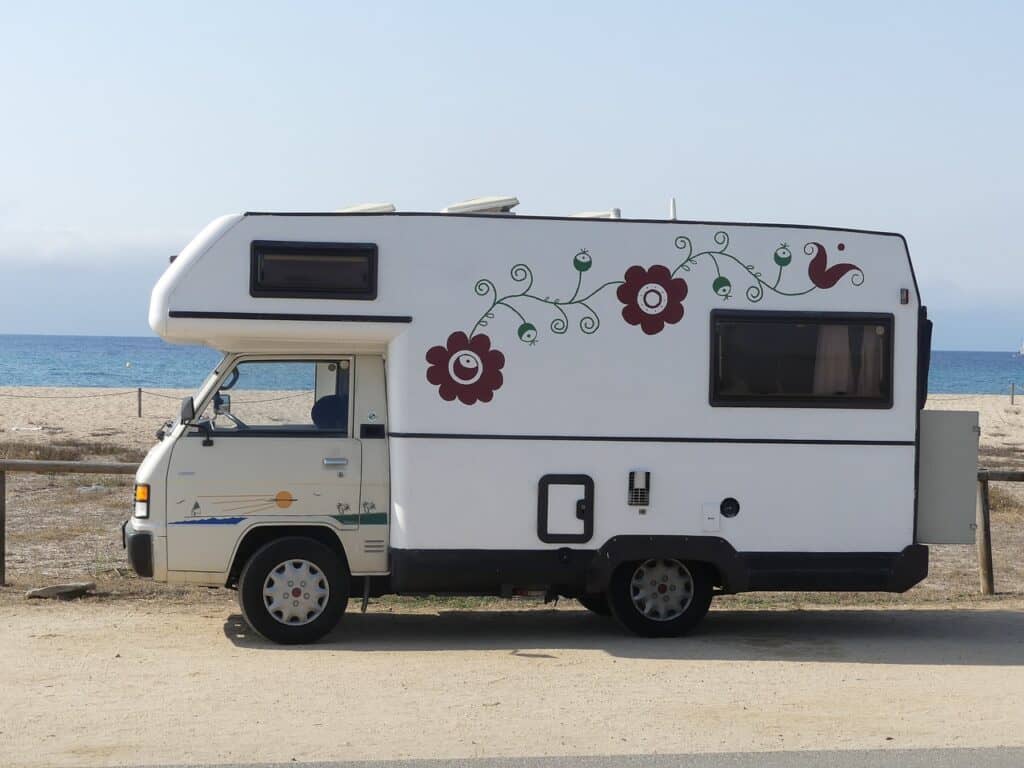Are you new to RV life? If so, then you’ve got a lot to learn before heading out on the open road.
Continue reading to learn about some common mistakes new RVers make and how you can avoid making them.
10. Not Taking Your RV’s Size into Consideration

RVs are huge vehicles. And, it’s of the utmost importance that you consider their size when operating them. That means making sure you don’t take routes with low-clearance bridges or tunnels that may require you to pay for a permit if your RV is of a certain height and width.
“Tail swing” is something else you should take into consideration. You need to know how far the back of your RV will swing out in the opposite direction when turning. Not knowing your RV’s tail swing “can cause wrecks and other damage”
Cheapism.com wrote on its website.
9. Forgetting to Download a Map or Directions
Google Maps and GPS are okay. But, what if something goes wrong and you aren’t able to access them? After all, technology fails all the time.
That’s why it’s best to download a map or directions before you hit the road. An even better option is to write down or print out the directions so you won’t have to rely on your cell phone at all.
ALL TIME TIP: Purchase an RV-specific GPS to avoid any navigation mistakes Google Maps might make. For example, Google Maps could send you across a bridge with low clearance or weight restrictions.
8. Not Planning Ahead
Do yourself a favor and plan your route in advance. This includes any fun or educational activities you wish to engage in, as well as enjoying time on the road.
As such, Travel + Leisure magazine recommends keeping an eye out on “quirky roadside attractions” that could make your trip even more memorable.
All in all, remember to take it slow. Don’t drive too fast because you might miss out on something — not to mention you could put yourself and others in danger if you drive at high speeds.
7. Over or Under-Packing
It’s never a good idea to over-pack or under-pack no matter how you’re traveling — be it by car, plane, bus, or train. And, the same rule applies when traveling by RV.
As such, Outdoorsy cofounder and CMO Jen Young recommends checking what the weather will be like in your destination so that you can plan accordingly.
You should check the forecast early in the planning process and continue to monitor weather conditions as the date for your trip approaches.
6. Not Doing a Practice Run
If you’re new to RVing, it’s a good idea for you to make a practice run before hitting the open road. Why? Well, for one thing, you’re a newbie. And, driving an RV is not quite the same as driving a car.
Because you’re inexperienced, you’re likely to be nervous and make a few careless mistakes along the way. But, a practice run can help you get a feel for operating the vehicle.
That being said, you should “take your time and get familiar with driving the RV in a safe, open area like a large parking lot where there’s no one around and put out some safety cones,” says Marc and Julie Bennett of the RV Love, according to an article published by Cheapism.
“Schools on weekends are a good option. Practice driving, staying in lanes, turning, parking, and backing up until you get the hang of it. It’s better to encounter cone obstacles while you’re learning instead of real ones, like trees!”
5. Not Closing the Vents
Roof vents help keep your RV ventilated. But, forgetting to close them can result in water damage — and that could do some major damage to your wallet. So, do yourself a favor and remember to close those vents.
And, while you’re at it, make sure you close all the windows, too. Also, don’t forget to put the antennas and satellite dishes down. They could get ripped off while you’re driving down the road and cause damage to the roof, which could lead to more water damage.
4. Forgetting to Retract the Leveling Jacks
Leveling jacks help to ensure your camper or RV is completely level and can handle the load. Unfortunately, if your RV has a manual leveling system, you might forget to retract them. And, if that happens, you can count on shelling out quite a few bucks — to repair it or replace it.
That’s because forgetting to retract the manual scissor jacks can not only ruin your jacks but possibly even warp your RV’s frame! If you haven’t purchased an RV just yet, you really should consider buying one with a hydraulic leveling system instead.
3. Not Taking Breaks
If you were going on a road trip in your car, you’d take breaks, right? So, why not in your RV? Yes, technically, it’s a house on wheels, but that doesn’t mean you won’t ever get tired or need to get something to eat or drink.
Marc and Julie Bennett of the RV Love suggest stopping every two to three hours to rest, use the bathroom, and get a bite to eat as well as something to drink.
ALL TIME TIP: To make sure you don’t overdo it, you should try to drive no more than 300 miles in one day.
2. Arriving at Your Destination After Dark
Arriving at a campground or RV park after dark might seem like a good idea — especially if you’ve been driving all day and are ready to get some shut-eye. But, for an inexperienced RVer, arriving at your destination after dark is one of the worst things you can do.
That’s because it’s harder to see in the dark, and you haven’t truly adjusted to the feel of your RV. As a result, you run the risk of hitting something while you’re trying to park. On that note, do yourself a favor and make sure you arrive while there’s still plenty of daylight left.
1. Not Following Campground Rules
When going to a campground, you need to keep in mind that you will be around other people. So you should know that there are certain written and unwritten rules that RVers need to follow so that everyone enjoys their trip. These rules include:
- Read and follow the campground or RV park rules.
- Drive slowly.
- Don’t engine for more than a few minutes.
- Don’t leave food outside of your RV. Instead, dispose of it properly.
- Don’t play your music too loud or for too long.
- Make sure your kids aren’t too loud or getting into trouble.
- Keep your pets on a leash.
- Pick up after your pets.
- Don’t walk through other people’s campsites.







